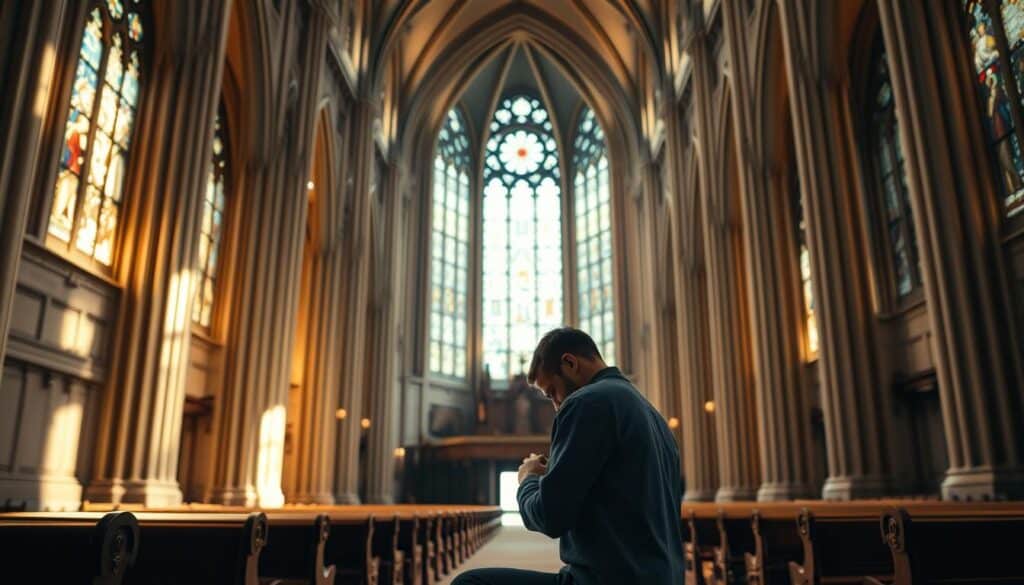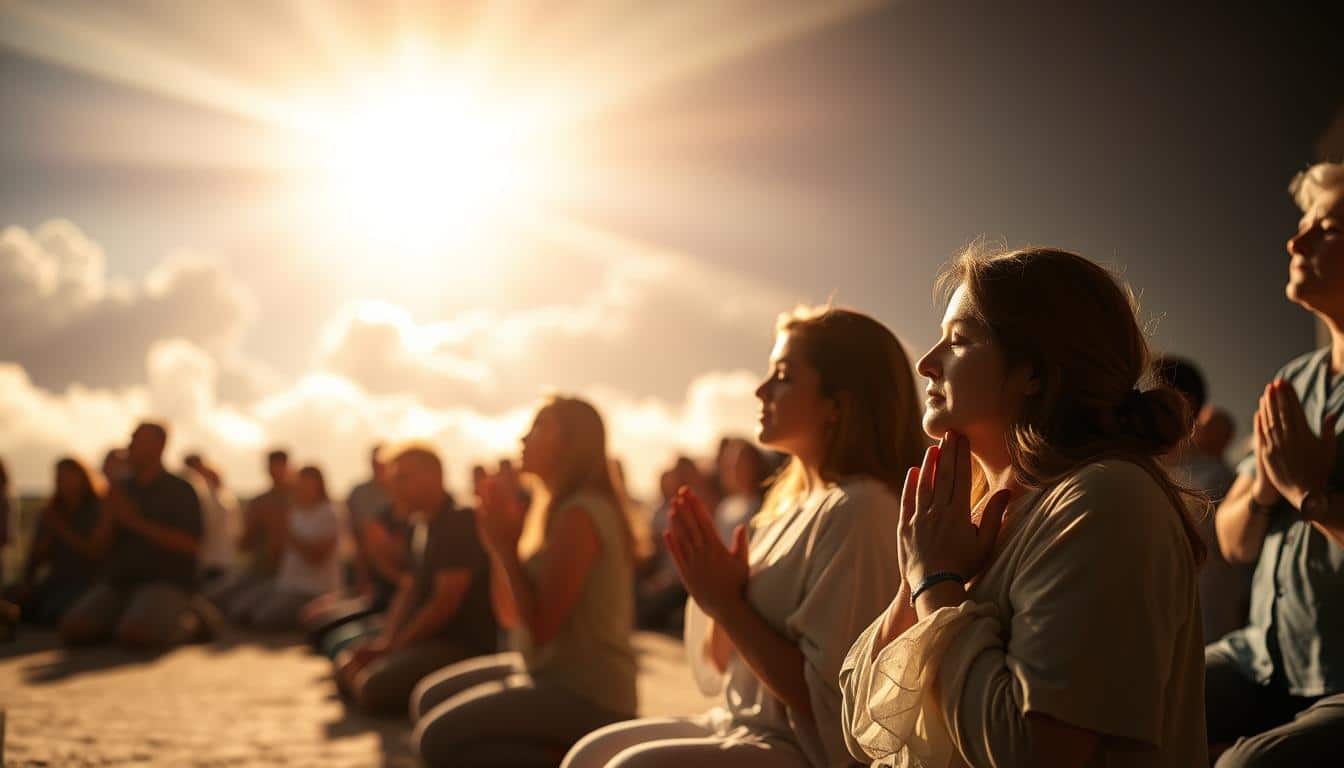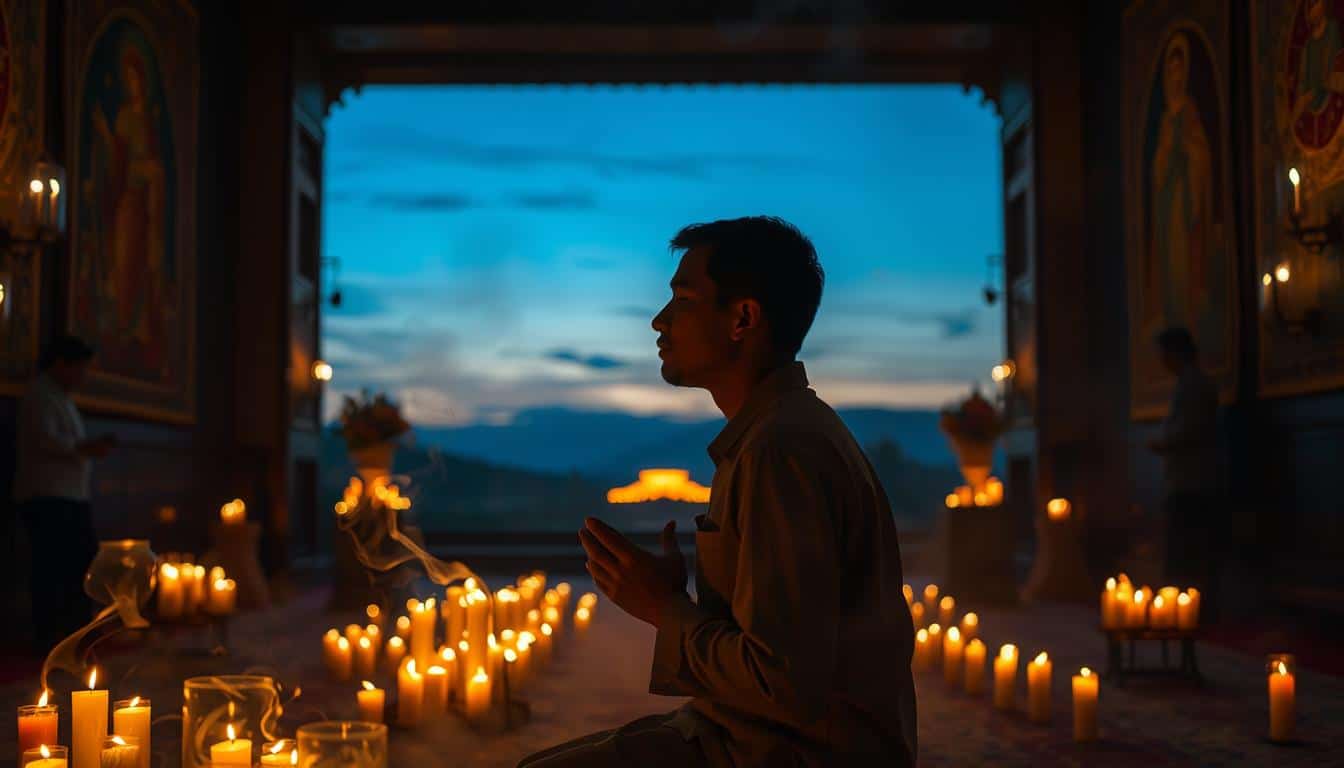In today’s complex world, connecting prayer and social justice is key for change. Prayer justice means using spiritual expression to push for legal rights and fairness. This article will show how prayer is more than personal reflection.
It’s also a strong way to bring people together to fight for justice. Recognizing the important role of prayer helps us see its value in creating a fairer society.
The Concept of Prayer Justice
The idea of prayer justice links faith and social duty. It shows how prayer can push for changes in society beyond just personal beliefs. It means committing to fairness and equality through spiritual actions.
Anúncios
Deuteronomy 16:20 tells us that seeking justice is essential. This is supported by religious teachings and working together in our communities.
Defining Prayer Justice
Prayer justice combines prayer with fighting for what’s right. It shows that praying isn’t just for ourselves. It can also inspire groups to work for fairness.
When we face unfairness, prayer offers spiritual support. It helps believers tackle big issues.
The Importance of Prayer in Justice
Prayer is a key force in pushing for justice. It motivates people and groups to listen to calls for fairness. With prayer, they look for divine direction to fight injustices.
Luke 18:7 shows how prayer can bring people together. It encourages them to act for justice and make society better.

Historical Perspectives on Justice and Prayer
The story of justice and prayer in the Bible is long and woven deep. Through time, prayer has been a key way people ask for justice, alone and together. Figures in history who prayed show us how faith and acting for what’s right can blend smoothly.
Biblical Foundations of Justice through Prayer
The Bible shows prayer and justice are closely linked. Prophet Habakkuk is a strong example, calling on God when faced with unfairness. Verses like Psalm 37:28 show God’s deep love for justice, reminding us prayer is more than personal—it’s a shared plea for fairness.
Historical Figures Promoting Justice Through Prayer
Many who prayed throughout history sparked big changes. Martin Luther King Jr. is a powerful example. He shared how prayer fueled his fight for equal rights. King’s life shows how prayer can bring people together to fight for what’s fair.
Current Issues Surrounding Justice in Society
Today’s society faces big challenges related to justice and fairness. Issues like socioeconomic differences and political turmoil are at the forefront. They greatly affect our communities. It’s crucial to understand these challenges to fight for economic and social justice.
Socioeconomic Disparities and Inequality
Socioeconomic differences lead to a gap. This gap affects marginalized groups the most, due to systemic inequality. Having access to education, healthcare, and jobs tends to favor those who are already privileged. This leaves many without what they need.
This kind of inequality stops justice in its tracks. It makes it hard for people to have a say in society. Communities facing these issues need special attention. This ensures they are treated fairly and can represent themselves.
Political Unrest and Its Impact on Justice
Political turmoil often highlights social injustices, adding tension and unfairness. Even when communities try to raise their voices, chaos can drown them out. However, faith communities play a big part during these times.
Through prayer and getting people together, they can bring about unity and change. This is a lesson learned from history, by those who fought for justice in tough times. The relationship between political unrest and justice is important for advocates aiming for a better future.
The Role of Prayer in Social Change
Prayer is vital for social change and bringing communities together. It’s a strong force that gets people united for a common goal. The Civil Rights Movement showed how prayer can rally folks to fight injustice and work together.
Prayer as a Tool for Community Mobilization
Prayer-led activism boosts community strength. This shared spiritual activity helps people support each other and push for change. Prayer meetings often lead to big movements that tackle important social issues. They help build a sense of unity and a drive for justice.
Case Studies of Prayer Leading to Justice Actions
Many case studies show how effective prayer is in sparking actions for justice. Rallies for immigration reform often include prayer, which unites participants. Also, prayers after police brutality incidents motivate communities to demand change and reform. These examples prove that prayer can inspire individuals and lead to big advocacy efforts.
Prayer Justice in the Church Community
Mixing prayer teaching with church services can deeply affect how churchgoers connect with social justice issues. By including prayers for justice in worship, people start to notice the big problems affecting those around them. It helps create an environment where everyone feels it’s their duty to stand up for justice as part of their faith.
Integrating Prayer Instruction in Church Services
Church leaders have a great chance to show how prayer and justice are linked. Prayers focusing on justice can open eyes and motivate action. Including these prayers in services makes people think about their role in supporting fairness. This approach builds a community feeling of duty that goes beyond just attending church.
The Need for Teachings on Social Justice
Churches need to provide strong teachings on justice in their sermons and programs. Avoiding tough political topics means missing a chance to fight systemic injustice. Clear lessons on justice let church members know how they can help advocate for change. It supports the church’s goal to back social justice efforts, preparing a generation to enact change.
Intercessory Prayer and Advocacy
Intercessory prayer is a key way for believers to impact society for others. It connects people within faith communities. It also helps people stand up for those treated unfairly. This prayer style raises the voices that are often ignored. It drives community members to act and pray for change.
Understanding Intercessory Prayer
Intercessory prayer means asking a higher power to help others in tough times. It brings people closer and shows how faith can lead to action. Believers are pushed to pray for others consistently. This strengthens their resolve to help society. When faith groups pray together, they see the importance of helping those in need.
How Intercessory Prayer Fuels Activism
Those passionate about social justice see intercessory prayer as a starting point for their activism. Praying for others grows compassion and sparks action. The mix of prayer and action builds strong advocacy. People driven by their faith join in community work for change. They know their prayers offer spiritual support and lead to real-world help.
Building a Just Society Through Prayer
Prayer together is a strong force for creating a fair society. When people pray as one, they feel a shared goal and unity. This common bond strengthens their beliefs and joins them in their quest for change through prayer.
The Role of Collective Prayer
Collective prayer helps make a supportive space for justice seekers. By joining their thoughts and voices, they become stronger together. This shared faith boosts their commitment and makes a bigger difference in their communities.
Prayer as a Catalyst for Action
History shows us that faith-based movements can lead to major social changes. Believers feel that divine justice and human actions are linked. They dive into action, proving prayer is more than words; it’s about making real changes.
Prayer Justice in the Context of Human Rights
Faith and advocacy meet in the human rights field, with prayer at its heart. Faith groups have always led the fight for human rights. They use prayer to fight for dignity, equality, and justice. This mix of prayer and activism shows the duty to help the oppressed.
The Link Between Faith and Advocacy for Human Rights
When faith leaders and their communities join forces, they become a strong voice for human rights. Their prayers share a vision of justice that touches others. This united prayer pushes people to act for a fairer world.
Prayers Addressing Human Rights Violations
Many prayers throughout history have focused on stopping human rights abuses. These prayers connect activism and justice. They shine a light on the wrongs done to marginalized folks and call for action. Each prayer is a loud call for everyone’s dignity and respect.
The Spiritual and Ethical Dimensions of Justice
The link between spirituality and ethics in justice brings deep insights into divine justice. The Bible shows how God’s justice and character guide believers to fight for what is right in society. This idea of divine justice helps people see their part in spreading fairness and goodness.
Understanding Divine Justice in the Bible
In the Bible, divine justice is a key idea. It shows God’s promise to help those who are hurt. Verses like Psalm 11:7 show God’s goodness as a base for advocating justice. This tells believers to act like God, helping their communities and making sure justice is done.
Spiritual Growth Through Advocacy
Advocacy, through both prayer and action, helps believers grow spiritually. Working for justice deepens faith and shows the moral part of a religious life. Micah 6:8 tells us to mix justice, mercy, and humility into our daily lives. It encourages us to be advocates in how we treat others.
Community Engagement Through Prayer
Faith groups play a key role in bringing communities together through prayer. They use shared beliefs to build a strong base for social action. Prayer meetings help people come together to support common goals.
The Role of Faith Communities
Faith communities put a strong focus on social change. They offer places for people to meet and talk about important issues. Here, people find the courage to join in justice efforts, working as one.
Creating Supportive Spaces for Justice Advocacy
By creating spaces for justice discussions, faith groups boost engagement. These areas allow folks to express their worries and work on projects together. Such openness makes sure every opinion matters in pushing for justice.
Conclusion
Prayer justice is key in fighting for social fairness. By blending prayer’s strength with social activism, we bring real change. Prayer motivates us and reminds us that seeking justice is sacred.
We must think about how believers actively support fairness and equality. Looking back and ahead, we are encouraged to find how prayer can start movements. It also helps bring people together for justice.
Linking our faith with action helps tackle today’s big issues. In the end, prayer justice guides communities to fight inequality. It makes sure we all help make our society fairer and just.
FAQ
What is prayer justice?
How does prayer inspire action for justice?
What biblical foundations support prayer’s role in justice?
Can you provide examples of historical figures who have used prayer for social justice?
What current issues can prayer justice address today?
How does prayer serve as a tool for community mobilization?
What role do churches play in promoting prayer justice?
What is intercessory prayer, and how does it fuel activism?
How does collective prayer impact social justice efforts?
What is the connection between faith and human rights advocacy?
How can individuals engage in justice advocacy through prayer?
Conteúdo criado com auxílio de Inteligência Artificial



